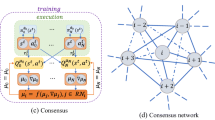Abstract
Compositionality is a key design feature of human language: the meaning of complex expressions is, for the most part, systematically constructed from the meanings of its parts and their manner of composition. This paper demonstrates that rudimentary forms of compositional communicative behavior can emerge from a variant of reinforcement learning applied to signaling games. This helps explain how compositionality could have emerged gradually: if unsophisticated agents can evolve prevalent dispositions to communicate compositional-like, there is a direct evolutionary benefit for adaptations that exploit the systematicity in form-meaning mappings more rigorously.






Similar content being viewed by others
References
Argiento, R., Pemantle, R., Skyrms, B., & Volkov, S. (2009). Learning to signal: Analysis of a micro-level reinforcement model. Stochastic Processes and their Applications, 119, 373–390.
Barrett, J. A. (2007). Dynamic partitioning and the conventionality of kinds. Philos. Sci., 74, 527–546.
Barrett, J. A. (2009). The evolution of coding in signaling games. Theor. Decis., 67, 223–237.
Barrett, J. A., & Zollman, K. J. S. (2009). The role of forgetting in the evolution and learning of language. Journal of Experimental and Theoretical Artificial Intelligence, 21(4), 293–309.
Batali, J. (1998). Computational simulations of the emergence of grammar. In J. R. Hurford, M. Studdert-Kennedy, & C. Knight (Eds.), Evolution of language: Social and cognitive bases. Cambridge: Cambridge University Press.
Blume, A., Kim, Y. G., & Sobel, J. (1993). Evolutionary stability in games of communication. Games and Economic Behavior, 5(5), 547–575.
Brinkhorst, S. (2014). On evolution of compositionality. Master’s thesis, Universiteit van Amsterdam.
Brochhagen, T. (2015). Minimal requirements for productive compositional signaling. In Proceedings of CogSci (pp. 285–290).
Franke, M., & Jäger, G. (2012). Bidirectional optimization from reasoning and learning in games. Journal of Logic, Language and Information, 21(1), 117–139.
Franke, M., & Wagner, E. (2014). Game theory and the evolution of meaning. Language and Linguistics Compass, 8(9), 359–372.
Frege, F. L. G. (1923). Gedankengefüge. In Beiträge zur Philosophie des deutschen Idealismus, Band III. (pp. 36–51). Deutsche Philosophische Gesellschaft.
Gong, T. (2007). Language evolution from a simulation perspective: On the coevolution of compositionality and regularity. Hong Kong: Chinese University of Hong Kong.
Hurford, J. R. (1989). Biological evolution of the saussurean sign as a component of the language acquisition device. Lingua, 77(2), 187–222.
Huttegger, S. M. (2007). Evolution and the explanation of meaning. Philosophy of Science, 74, 1–27.
Huttegger, S. M., & Zollman, K. J. S. (2011). Signaling games: Dynamics of evolution and learning. In A. Benz, C. Ebert, G. Jäger, & R. van Rooij (Eds.), Language, games, and evolution, LNAI 6207 (pp. 160–176). Berlin: Springer.
Huttegger, S. M., Skyrms, B., Smead, R., & Zollman, K. J. S. (2010). Evolutionary dynamics of lewis signaling games: Signaling systems vs. partial pooling. Synthese, 172(1), 177–191.
Kirby, S. (2002). Learning, bottlenecks and the evolution of recursive syntax. In T. Briscoe (Ed.), Linguistic evolution through language acquisition: Formal and computational models (pp. 173–204). Cambridge: Cambridge University Press.
Kirby, S., & Hurford, J. R. (2002). The emergence of linguistic structure: An overview of the iterated learning model. In A. Cangelosi & D. Parisi (Eds.), Simulating the evolution of language (pp. 121–148). Berlin: Springer.
Lewis, D. (1969). Convention. A philosophical study. Cambridge, MA: Harvard University Press.
Lewis, D. (1988). Relevant implication. Theoria, 54, 162–174.
Loreto, V., Baronchelli, A., & Puglisi, A. (2010). Mathematical modeling of language games. In S. Nolfi & M. Mirolli (Eds.), Evolution of communication and language in embodied agents (pp. 263–281). Berlin: Springer.
Mühlenbernd, R. (2011). Learning with neighbors: Emergence of convention in a society of learning agents. Synthese, 183, 87–109.
Nowak, M. A., & Krakauer, D. C. (1999). The evolution of language. Proceedings of the National Academy of Sciences, 96, 8028–8033.
Nowak, M. A., Plotkin, J. B., & Jansen, V. A. A. (2000). The evolution of syntactic communication. Nature, 404(30), 495–498.
O’Connor, C. (2014). The evolution of vagueness. Erkenntnis, 79(4), 707–727.
Oliphant, M., & Batali, J. (1997). Learning and the emergence of coordinated communication. Center for Research on Language Newsletter, 11(1), 1–46.
Pagin, P., & Westerståhl, D. (2010a). Compositionality I: Definitions and variants. Philosophy Compass, 5(3), 250–264.
Pagin, P., & Westerståhl, D. (2010b). Compositionality II: Arguments and problems. Philosophy Compass, 5(3), 265–282.
Pawlowitsch, C. (2008). Why evolution does not always lead to an optimal signaling system. Games and Economic Behavior, 63(1), 203–226.
Roth, A. E., & Erev, I. (1995). Learning in extensive form games: Experimental data and simple dynamical models in the intermediate term. Games and Economic Behavior, 8(1), 164–212.
Selten, R. (1980). A note on evolutionarily stable strategies in asymmetric animal conflicts. Journal of Theoretical Biology, 84, 93–101.
Skyrms, B. (2010). Signals: Evolution, learning, and information. Oxford: Oxford University Press.
Smead, R., & Zollman, K. J. S. (2013). The stability of strategic plasticity. Unpublished manuscript.
Smith, K., Kirby, S., & Brighton, H. (2003). Iterated learning: A framework for the emergence of language. Artificial Life, 9, 371–386.
Steinert-Threlkeld, S. (2014). Learning to use function words in signaling games. In E. Lorini, & L. Perrussel (Eds.), Proceedings of information dynamics in artificial societies IDAS-14.
Tria, F., Galantucci, B., & Loreto, V. (2012). Naming a structured world: A cultural route to duality of patterning. PLoS One, 7(6), e37,744.
Wärneryd, K. (1993). Cheap talk, coordination, and evolutionary stability. Games and Economic Behavior, 5(4), 532–546.
Zollman, K. J. S., & Smead, R. (2010). Plasticity and language: An example of the Baldwin effect? Philosophical Studies, 147(1), 7–21.
Acknowledgments
The development of this material has benefited from comments of and discussions with many colleagues: Jeffrey Barrett, Sven Banisch, Sanne Brinkhorst, Rüdiger Gleim, Simon Kirby, Harvey Lederman, Robert van Rooij, Shawn Simpson, Shane Steinert-Threlkeld, Peter Vogt, and Elliott Wagner. I would also like to thank three anonymous referees for insightful comments and suggestions, as well as the editors of this special issue for their efforts. Financial support by NWO-VENI Grant 275-80-004 and the Institutional Strategy of the University of Tübingen (Deutsche Forschungsgemeinschaft, ZUK 63) is gratefully acknowledged.
Author information
Authors and Affiliations
Corresponding author
Rights and permissions
About this article
Cite this article
Franke, M. The Evolution of Compositionality in Signaling Games. J of Log Lang and Inf 25, 355–377 (2016). https://doi.org/10.1007/s10849-015-9232-5
Published:
Issue Date:
DOI: https://doi.org/10.1007/s10849-015-9232-5




